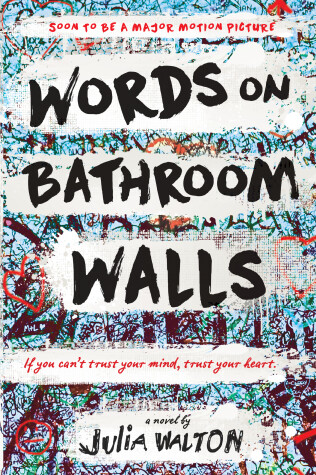Reviewed by Jo on
Words on Bathroom Walls by Julia Walton sounded like such a great book, but I found I was disappointed.
Adam refuses to talk to his therapist, as he doesn't think therapy will help - it's not going to cure him, not going to make him better, so why bother? So instead, his therapist gets him to write instead; he asks him questions during therapy sessions, and Adam answers them and tells him what's happening in his life later, on a notepad. And that is how the story is told, by Adam writing to his therapist. I've read books previously where the whole book was the main character writing to someone, but Words on Bathroom Walls is more realistic in that Adam doesn't write as if the things are happening as he writes them. Which means there is very, very little dialogue, and mostly just stream of consciousness on Adam's part. And I just really didn't like it.
Everything we read is told to us by Adam, we don't actually see any of it. So we don't see relationships develop, we don't really get to know the other characters, we're just told about them, told about the things that happened, and told how Adam is feeling and what he's thinking. And to be honest, not much really happens. He's taking this new medication, which means he now is now able to tell that his visions and the voices he hears aren't really real, which makes it easier to ignore them when they tell him to do things. So, they're just there, while he goes about his normal teenage life where nothing all that interesting happens. He meets a girl, a relationship starts. He makes a friend. He's bullied. But, again, we're all told about it rather than getting to see it. There's a detachment. And I didn't like it, I found it really difficult to connect with the story.
And the story was also really predictable. As we're told in the blurb, the drug works for a while, until it doesn't, and then things start to go wrong. And you can tell what will happen, and you know where things will go after the events. It was just so predictable. That, along with storytelling that isn't to my taste, I just didn't really enjoy the book.
I must say that I think Adam's Schizophrenia was dealt with well - being said who has no experience of Schizophrenia. I just felt like I understood Adam and how he was feeling. What it was like to see and hear things nobody else could see or hear. It was emotional, especially when the class is talking about a Schizophrenic guy who went into a school and shot teachers and kids, and someone shouts out 'Why didn't he just kill himself?' At those times, it was just heartbreaking to read Adam really seeing what people think of people like him, and he can do nothing about it, because he doesn't want anyone to know, but still it hurts, and makes him angry. No-one knows what it's like to be him, and no-one knows what it's like to lose control.
But overall, this book just wasn't for me. I much preferred Made You Up by Francesca Zappia, thought that is about a girl with Paranoid Schizophrenia, so it's slightly different. This wasn't the right fit for me, but it might be for you, so do read a few other reviews before deciding whether or not you want to read Words on Bathroom Walls.
Thank you to Random House Books for Young Readers via NetGalley for the eProof.
Reading updates
- Started reading
- 14 September, 2017: Finished reading
- 14 September, 2017: Reviewed
